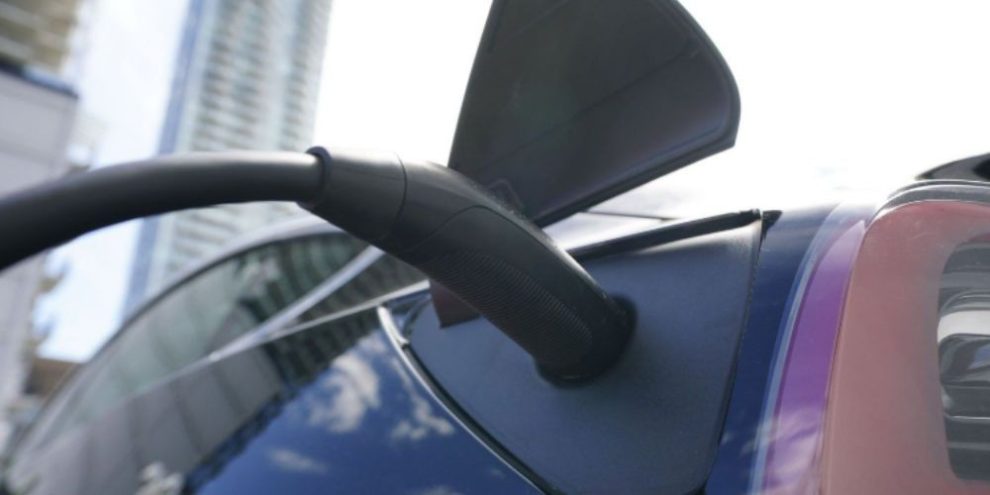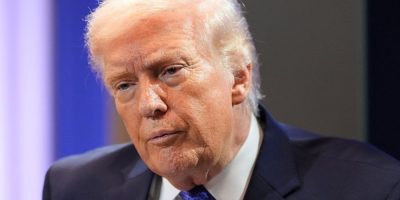
Updated September 5, 2025 @ 7:43pm
The federal electric vehicle sales mandate will not be implemented in 2026 as planned, Prime Minister Mark Carney said Friday, pushing back by at least a year a policy that would have set minimum sales targets for electric and plug-in hybrid vehicles.
Introduced by the Liberals under former prime minister Justin Trudeau, the mandate would have required 20 per cent of all new vehicles sold in Canada next year to be electric.
The standard as written is to rise steadily each year until 2035, by which point all new light-duty vehicles sold in Canada were to be fully electric or plug-in hybrids.
But at a press conference in Mississauga, Ont., Carney said he is suspending the mandate for 2026 and launching a 60-day review of the program to help find "future flexibilities and ways to reduce costs."
Barrie's News Delivered To Your Inbox
By submitting this form, you are consenting to receive marketing emails from: Central Ontario Broadcasting, 431 Huronia Rd, Barrie, Ontario, CA, https://www.cobroadcasting.com. You can revoke your consent to receive emails at any time by using the SafeUnsubscribe® link, found at the bottom of every email. Emails are serviced by Constant Contact
In a background document provided to journalists, the government said the review "will consider potential amendments to the annual sales targets, including the 2035 goal, and will explore possible additional flexibilities."
Carney said Canada's domestic automakers need more liquidity in the face of pressures from the ongoing trade war with the United States.
"They've got enough on their plate right now," Carney said. He did not commit to fully repealing the mandate, as the larger car manufacturers have recommended.
"We're using this as an opportunity, as part of a broader strategy on climate competitiveness, to look at all our measures to help get greenhouse gases down in the key sectors," he added.
EV sales in Canada hit a monthly high of 18 per cent last year when the government was offering consumer rebates of up to $5,000.
Sales plunged after the government abruptly ended the popular rebate program when its funding ran out. The most recent data from Statistics Canada showed EV sales accounted for nearly eight per cent of all new vehicle sales in June.
Ottawa has promised to bring back consumer rebates for EVs but it hasn't said when — much to the annoyance of automakers, who say the lack of clarity is hurting EV sales as buyers await the return of the rebates.
The decision to suspend the mandate for a year comes after months of lobbying from the auto industry — and a recent pledge from the federal Conservatives to target the mandate when Parliament returns this month.
David Adams is president of the Global Automakers of Canada, which represents several carmakers, including Toyota, Honda and Hyundai. He said he welcomes the suspension, but added Quebec and British Columbia — which also have EV sales mandates — need to follow Ottawa's lead.
"Our members are pleased that the government has recognized that the consumer adoption of electric vehicles is not where government nor industry anticipated it might be," Adams told The Canadian Press.
"A few short years ago this is what we had asked of the government, that they undertake a pause-and-review approach so they can figure out what the latent demand is for these vehicles, without necessarily incentives or anything else."
In July, Carney met with the heads of Ford Canada, Stellantis Canada and GM Canada, who told the prime minister there was no way for the industry to meet the targets set out in the EV mandate.
The head of the Canadian Vehicle Manufacturers’ Association, which represents those three companies, said the pause on the EV mandate is "an important first step" but still called for its repeal.
"The EV mandate imposes unsustainable costs on auto manufacturers, putting at risk Canadian jobs and investment in this critical sector of the economy," Brian Kingston said in a media statement.
Speaking with The Canadian Press, Kingston said not even the return of consumer rebates for EVs would be enough to make the sales mandate sustainable.
"The only way you could achieve the arbitrary targets established in the mandate is by introducing very strong consumer incentives. You see a direct correlation between EV demand and incentives in the market," Kingston said, adding Ottawa would have to put up at least $1 billion a year to achieve a 20 per cent sales target.
"That's not good public policy and that's not sustainable from a fiscal perspective."
In 2024, electric vehicles neared almost 15 per cent of total new vehicles registered across the country but that was concentrated in two provinces.
British Columbia and Quebec both exceeded the 20 per cent marker — Quebec hit 31 per cent — and accounted for almost three in every four new EVs registered across the country.
No other province even hit 10 per cent.
B.C. Energy Minister Adrian Dix said Friday that he believed Ottawa's decision was driven by circumstances in Ontario, and he hoped the 60-day review would yield policies to address barriers to EV sales such as affordability and charging networks.
Dix said EV demand was still strong in B.C. and Ottawa should adopt electric-vehicle policies that reflect the situation in provinces beyond Ontario.
"I want to say this: Their target for this year, we achieved four years ago," Dix said.
"The issue here in Canada — and I think the federal government needs to engage in this a little bit — is first and foremost with Ontario."
Carney on Friday promised new options to bring more affordable electric vehicles to Canadians. He wouldn't commit to repealing the 100 per cent tariff Canada imposed on cheaper Chinese EVs, a measure up for review by the end of this month.
China imposed tariffs on Canadian canola in August which were widely seen as retaliation for the EV duties.
Canada introduced tariffs on Chinese EVs last year in lockstep with the United States. Kingston said repealing them would damaging the domestic auto industry by putting it on an uneven playing field with highly subsidized Chinese EVs.
Speaking with reporters on Parliament Hill in Ottawa, Conservative leader Pierre Poilievre said he wouldn't lift the tariffs on Chinese EVs as a way to support the canola sector.
"China wants these electric vehicles to be roving surveillance operations on our streets, and in 10 years God forbid there's a conflict and there's millions of those vehicles surveilling our population in our streets," Poilievre said.
Carney was also pressed by reporters on his overall commitment to climate change, given recent policy changes which moved away from aggressive climate action from the Trudeau government.
He said, in French, the fight against climate change is a "moral obligation" and he committed to reducing emissions, though he signalled it must be one in the context of trade and competitiveness too.
"We will keep the industrial carbon pricing. We have to improve its function. And there will be a political strategy for climate competitiveness, and a strategy for nature," Carney said in French.
"We will put emphasis on results as it relates to greenhouse gas emissions."
Still, those words gave little reassurance to environmental groups who lambasted the government for its pausing of the EV mandate.
"What was the point of electing Mark Carney when we get Pierre Poilievre's climate policy?" said Keith Stewart, a senior energy strategist with Greenpeace.
"We should be aligning with Europe, which is doubling down on renewable energy and electric vehicles, rather than bowing before Trump's attack on people and planet."
This report by The Canadian Press was first published Sept. 5, 2025.
Speaking with The Canadian Press, Kingston said not even the return of consumer rebates for EVs would be enough to make the sales mandate sustainable.
"The only way you could achieve the arbitrary targets established in the mandate is by introducing very strong consumer incentives. You see a direct correlation between EV demand and incentives in the market," Kingston said, adding Ottawa would have to put up at least $1 billion a year to achieve a 20 per cent sales target.
"That's not good public policy and that's not sustainable from a fiscal perspective."
In 2024, electric vehicles neared almost 15 per cent of total new vehicles registered across the country but that was concentrated in two provinces. British Columbia and Quebec both exceeded the 20 per cent marker — Quebec hit 31 per cent — and accounted for almost three in every four new EVs registered across the country.
No other province even hit 10 per cent.
Carney on Friday promised new options to bring more affordable electric vehicles to Canadians. He wouldn't commit to repealing the 100 per cent tariff Canada imposed on cheaper Chinese EVs, a measure up for review by the end of this month.
China imposed tariffs on Canadian canola in August which were widely seen as retaliation for the EV duties.
Canada introduced tariffs on Chinese EVs last year in lockstep with the United States. Kingston said repealing them would damaging the domestic auto industry by putting it on an uneven playing field with highly subsidized Chinese EVs.
Carney was also pressed by reporters on his overall commitment to climate change, given recent policy changes which moved away from aggressive climate action from the Trudeau government.
He said, in French, the fight against climate change is a "moral obligation" and he committed to reducing emissions.
"We will keep the industrial carbon pricing. We have to improve its function. And there will be a political strategy for climate competitiveness, and a strategy for nature," Carney said in French.
"We will put emphasis on results as it relates to greenhouse gas emissions."
Still, those words gave little reassurance to environmental groups who lambasted the government for its pausing of the EV mandate.
"What was the point of electing Mark Carney when we get Pierre Poilievre's climate policy?" said Keith Stewart, a senior energy strategist with Greenpeace.
"We should be aligning with Europe, which is doubling down on renewable energy and electric vehicles, rather than bowing before Trump's attack on people and planet."
This report by The Canadian Press was first published Sept. 5, 2025.





